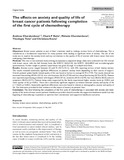| dc.description.abstract | Objectives: Breast cancer patients as part of their treatment need to undergo various forms of chemotherapy. This is
considered as a burdensome experience for many patients often leading to significant levels of anxiety. The aim of the
study was to explore the anxiety levels and any correlations to the quality of life of women with breast cancer that were undergoing chemotherapy.
Methods: This was a cross-sectional study utilizing an explanatory sequential design. Data were collected from 355 women with breast cancer with the Self Anxiety Scale, the EORTC QLQ-C30, the EORTC QLQ-BR23 and sociodemographic questionnaires. Further insight to patients’ experiences was given through 12 in-depth interviews.
Results: Anxiety scores ranged between 24 and 75 (45.7±10.11), with 44% reporting serious or/and intense anxiety.
The results revealed statistically significant differences on patients’ anxiety levels depending on their source of support.
Overall, patients’ global health-related quality of life was found to be low to average 55.91±17.94. The results showed low
emotional functioning (49.30±29.12), low role functions (56.34±27.50) and low sexual functioning (24.93±20.75). Patients
also reported experiencing problems with fatigue (49.04±29.12), insomnia (44.32±32.97), hair loss (48.25±38.32) and arm symptoms (36.53±23.71). Patients being solely supported by the family experienced higher anxiety levels (p<0.001) and lower quality of life (p<0.001). There was a statistically significant negative correlation between anxiety and quality of life (r=−0.623, p<0.001). Statistically significant differences were also found in relation to demographics, anxiety and quality of life. The interviews provided further evidence on the impact of anxiety on patients’ lives.
Conclusion: The time following the completion of the first cycle of chemotherapy is associated with anxiety and lower
quality of life levels in breast cancer patients. Healthcare providers should consider the supportive healthcare needs from the beginning of chemotherapy in patients to optimize their conventional and supportive healthcare outcomes. | en_UK |


